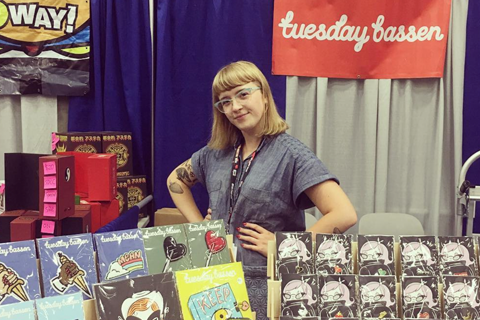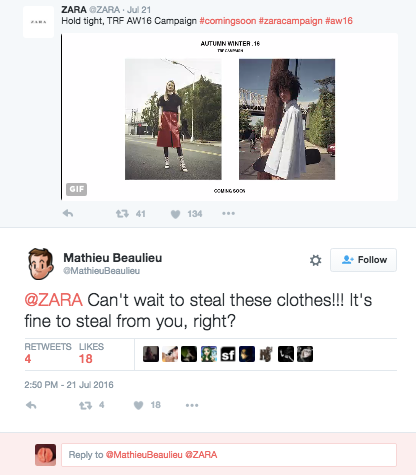Sign up to stay in the loop on new styles and sales!
Sign up to stay in the loop on new styles and sales!
Why Fast Fashion Is a Totally Feminist Issue (And What We Can Do About It)
thinx archive
·5 min read

by Vikki Knowles | 08/05/2016
@tuesdaybassen via Instagram
You might not think that whether that tee was churned out quicker than you can say what this season’s trends are was anything to do with feminism, but what with the diabolical sweatshop salaries - with women overwhelmingly being the makers, and men dominating the top jobs - we wouldn’t want to exploit our fellow women on the other side of the world, would we? And that includes our ladies closer to home, too. You may have seen Zara plastering media headlines recently, with indie illustrators accusing the fashion powerhouse of stealing their designs.
Dozens of designs have been allegedly stolen from over 20 indie artists (guys and gals), and the comparisons seem way seems too similar to be some kind of (repetitive) coinky-dink. Cue gasps of: WTF???
“Once is a mistake. This many times is inexcusable,” notes one of the victims, Brooklyn-based artist Adam J. Kurtz. He’s whipped up ShopArtTheft.com, which shows artists’ designs Vs. Zara’s ‘copycat’ products. Award-winning artist and illustrator Tuesday Bassan has also had a crap time of it all. She said on Instagram: “I had my lawyer contact Zara and they literally said I have no base because I’m an indie artist and they’re a major corporation and that not enough people even know about me for it to matter.”
She’s already lost $2k in legal fees (talk about David and Goliath). Luckily, a swarm of people, who are not so cool with their talented indie artists being taken advantage of, took to Facebook, Twitter and Instagram to vent. On Zara’s Twitter page, folk are replying to the brand’s latest fashion tweets with quips such as:

Zara has since removed many of the offending items from its websites, and itspapa company, Inditex, has responded to various media outlets, includingVogue.
“Inditex has the utmost respect for the individual creativity of all artists and designers and takes all claims concerning third party intellectual property rights very seriously. Inditex was recently contacted by Tuesday Bassen’s lawyers who noted the use of illustrations in some badges sourced externally and on clothes in its Group stores. The Company immediately opened an investigation into the matter and suspended the relevant items from sale. Inditex’s legal team is also in contact with Tuesday Bassen’s lawyers to clarify and resolve the situation as swiftly as possible.” That doesn’t stop a ton of disappointed emoticons all over the shot. But, certainly it’s a power to the people moment for errr, ‘Davids’ everywhere:

You may also remember earlier in the year that H&M ran their World Recycle Week, which just so happened to coincide with Fashion Revolution Week – a yearly event commemorating the Rana Plaza disaster in Bangladesh, where 1,134 lives were lost. Lucy Siegle, eco-queen and producer behind the True Cost documentary (more on that later) was rightly p***ed. “It’s not just the audacity I object to,” Siegle said in a Guardian article, “It’s the timing”. Aka, don’t greenwash on our grassroots parade, big corps. Might be different if they were some cute little, super sustainable start-up. Not so. The campaign (essentially) encouraged more consumption, not less, and took the spotlight off garment workers. Not cool, man.
The masses shared the article like a hot potato while H&M’s PR peopleprobably got a bit sweaty under the collar. So, what can we do about this fast fashion malarky? Don’t panic - there are things we can do (and you don’t have to be raking in Beyonce’s salary to slow things down a touch).
Here are five things you can do to avoid the fast fashion spiral:
Tell ‘em how you feel.
‘Them’ being big fashion houses. If how they’re treating their workers/planet’s resources/indie designers/insert your own reason here _____ doesn’t sit right with you, condense your sentiments into 140 characters and fire it their way. As in the examples above, this can make a huge impact and hit the media fan.
Ask what the deal is.
Where was that slogan tee made? Who made it? How much were they paid? Uhh, they should actually know the answer to these. Feel free to ask embarrassingly loud in-store, like you’ve got headphones on. Then other customers can hear the answers. Capeesh
Take your business elsewhere.
Vote with your wallet. In the Zara example, you can support the artists affected by buying their work directly. Or, you can buy from cool brands that know who their makers are, and treat them well - like Thinx (et al).
Get your thrift on.
Buy an awesome tee for $3 from your fave thrift store, while cutting the demand on new clobber. Extra points for wearing it more than 30 times (“a sustainable purchase”) – buying it second-hand gives you a running start.
Swot up
Did you know that fashion is the second most polluting industry on the planet? Add sweatshops and a whole lot of textile waste to the mix and you’ve got some well-dressed trouble on your hands. Watch the True Cost documentary to clue you up, add some fire to that belly and get you balling like a baby in no time. It’s free on Netflix.
Vikki Knowles is a thrift lover and runs the blog SustyGirl.co.
by Vikki Knowles


